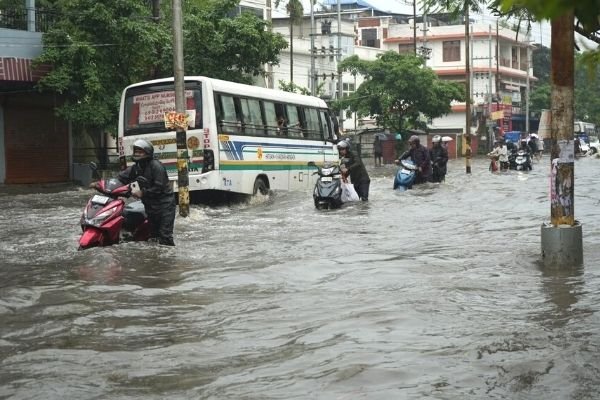HT Digital
Tuesday, October 15: Guwahati’s status as a smart city is now facing significant scrutiny due to the deteriorating condition of the Geetanagar Police Station, one of the city’s oldest police stations, which is struggling to operate in a hazardous and neglected setting. Established in 1983, the station serves a vast area under its jurisdiction. However, the building’s poor state is growing worse each day, to the extent that officers are now reluctant to accept postings at the station.
The issues at Geetanagar Police Station are particularly stark during the rainy season. Heavy monsoons often flood the premises, with water levels rising to the height of desks and tables. This constant flooding has caused significant damage to important documents, many of which have already been lost due to water damage. The overall infrastructure is in such poor condition that it has become a deterrent for officers, making it one of the least desirable places to work.
A former police officer who was once posted at Geetanagar described the experience as a nightmare. “It was my worst nightmare when I was posted there, especially when it rained. The police station wasn’t in good shape when I first got there. Since there was no suitable furniture, I had to pay for my own table and chair. Water seeped into the almirah, corroding it until it broke. That police station is the last place any officer would want to work,” he said, further emphasizing that while every officer, including seniors, is aware of the situation, no one is willing to take responsibility for its improvement.
Another officer, currently stationed at Geetanagar, echoed similar concerns. He spoke of the station’s crumbling furniture, outdated electrical wiring, and the generally filthy atmosphere that makes working there highly demotivating for both junior and senior officers. “Days go by before the floodwaters recede, and this increases the mosquito population. We have to place everything on higher ground to avoid damage from the water. The situation is so bad that we don’t even have the funds to replace everything that’s been damaged,” the officer explained.
He also mentioned that while other police stations are being renovated under the government’s MOITRI scheme, which is aimed at modernizing and refurbishing police stations across the state, Geetanagar’s station continues to be neglected despite being in far worse condition than many others. The frustration among officers is palpable. “Our senior officers have been informed about the situation numerous times, but no one seems to care. Even during my tenure here, no higher officer has shown any interest in the state of the station,” the officer added.
The toxic working environment has also taken its toll on the officers’ morale. With the station frequently flooded and in disrepair, the officers struggle to perform their duties under such difficult conditions. The poor infrastructure and unsanitary surroundings have made the station an unpleasant place to work, leaving officers increasingly frustrated with the lack of action from higher authorities.
Residents of the area are also voicing their concerns, urging local authorities to take immediate steps to renovate the police station. Locals point out that a clean, functional police station is not only necessary for the officers but also crucial for the community they serve. One resident commented, “How can we expect our police officers to do their jobs properly if they’re working in such terrible conditions? The government needs to fix this issue as soon as possible.”
As Guwahati pushes forward with its development as a smart city, infrastructure problems like those at the Geetanagar Police Station pose a serious challenge to the city’s progress. Residents and officers alike believe that if the city is to truly embrace its smart city title, essential facilities such as police stations should not be neglected. Addressing these issues is not only important for the safety and well-being of the city’s citizens but also crucial for the morale and efficiency of its law enforcement personnel.
The Geetanagar Police Station’s deteriorating condition has become symbolic of a broader issue within the city—one where basic infrastructure improvements are often overlooked, even as the city attempts to position itself as a modern urban center. The future of Guwahati as a smart city depends not just on grand projects but on ensuring that fundamental services and infrastructure, like its police stations, are up to standard.
The call for action is clear. For Guwahati to live up to its smart city ambitions, it must prioritize fixing the neglected parts of the city, starting with places like Geetanagar Police Station. Only then can the city ensure that both its citizens and its officials are able to work and live in a well-functioning, safe environment.







